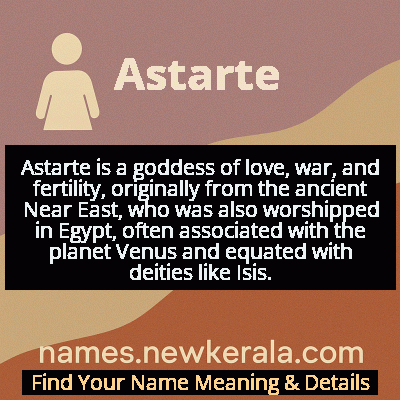Astarte Name Meaning & Details
Origin, Popularity, Numerology Analysis & Name Meaning of Astarte
Discover the origin, meaning, and cultural significance of the name ASTARTE. Delve into its historical roots and explore the lasting impact it has had on communities and traditions.
Name
Astarte
Gender
Female
Origin
Egyptian
Lucky Number
3
Meaning of the Name - Astarte
Astarte is a goddess of love, war, and fertility, originally from the ancient Near East, who was also worshipped in Egypt, often associated with the planet Venus and equated with deities like Isis.
Astarte - Complete Numerology Analysis
Your Numerology Number
Based on Pythagorean Numerology System
Ruling Planet
Jupiter
Positive Nature
Optimistic, inspirational, and creative.
Negative Traits
Scattered, exaggerating.
Lucky Colours
Yellow, gold, purple.
Lucky Days
Thursday.
Lucky Stones
Yellow sapphire.
Harmony Numbers
1, 2, 9.
Best Suited Professions
Arts, writing, communication.
What People Like About You
Creativity, optimism.
Famous People Named Astarte
Astarte (Mythological)
Ancient Goddess
Major deity worshipped across Mediterranean civilizations for millennia
Astarte (Opera Character)
Opera protagonist
Central figure in Baroque opera by Handel
Astarte (Literary Figure)
Mythological character
Influential presence in occult and fantasy literature
Name Variations & International Equivalents
Click on blue names to explore their detailed meanings. Gray names with will be available soon.
Cultural & Historical Significance
Extended Personality Analysis
The name Astarte carries powerful psychological associations derived from its mythological origins. Those named Astarte are often perceived as possessing intense charisma and magnetic presence, capable of commanding attention in any setting. They typically exhibit a remarkable balance of seemingly contradictory qualities - both nurturing and fierce, creative and destructive, gentle and powerful. This duality reflects the goddess's domains over both love and war. Astarte-named individuals often demonstrate strong leadership abilities, strategic thinking, and emotional depth. They tend to be highly intuitive and spiritually aware, with a natural understanding of life's cycles and transformations. Their strength lies in their ability to embrace complexity without seeking simplistic resolutions, making them excellent mediators and visionaries. While they can be passionate and determined when pursuing goals, they also possess deep compassion and understanding for others' struggles. This combination of traits often makes them influential figures in their communities, whether in artistic, spiritual, or professional contexts.
Modern Usage & Popularity
In contemporary naming practices, Astarte remains an uncommon but meaningful choice that has maintained a steady, niche popularity. The name appeals particularly to parents interested in mythology, ancient history, or seeking a powerful feminine name with deep cultural roots. While it doesn't rank on official baby name charts in English-speaking countries, it sees consistent use among alternative communities, including pagan, Wiccan, and goddess spirituality circles. The name has gained some traction in France and other European countries with stronger classical education traditions. In recent decades, there's been a slight uptick in usage coinciding with increased interest in mythological names and feminist naming practices that reclaim powerful female figures from history. Modern bearers of the name often appreciate its uniqueness and the rich symbolic heritage it carries. The name is more frequently used in literary contexts, appearing in fantasy novels and video games, which helps maintain its cultural presence even as it remains rare as a given name.
Symbolic & Spiritual Meanings
Astarte embodies profound symbolic meanings that transcend her historical worship. She represents the sacred feminine in its most complete form - the integration of all aspects of womanhood without hierarchy or apology. As a goddess of both fertility and warfare, she symbolizes the understanding that creation and destruction are two sides of the same cosmic process. Her association with the planet Venus as both morning and evening star makes her a symbol of transitions, thresholds, and the reconciliation of opposites. In psychological terms, Astarte represents the journey toward wholeness, where one embraces both light and shadow aspects of the self. She symbolizes sexual power as sacred rather than profane, and sovereignty as the right to self-determination. Modern interpretations often see her as an emblem of female empowerment, environmental consciousness (through her connection to fertility and nature), and the sacred balance between different forms of power. Her enduring symbolism speaks to timeless human concerns about life, death, love, conflict, and the search for meaning in a complex world.

